
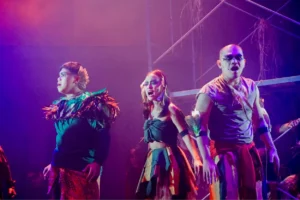
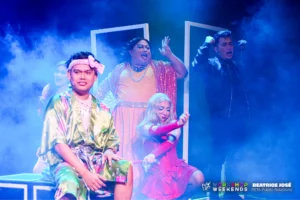
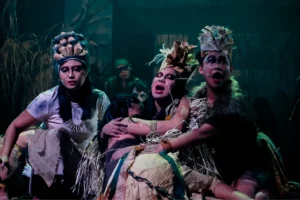

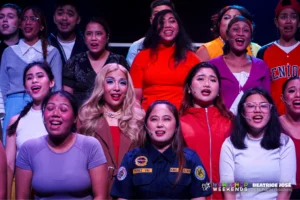
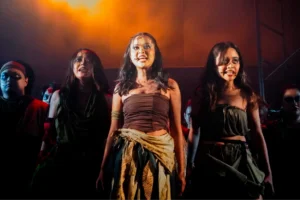
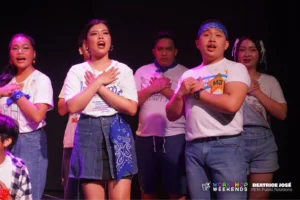

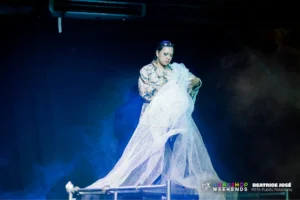
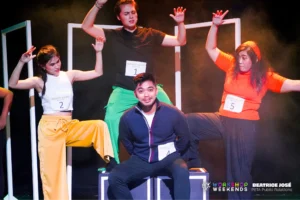
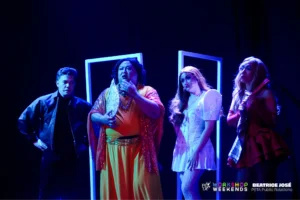




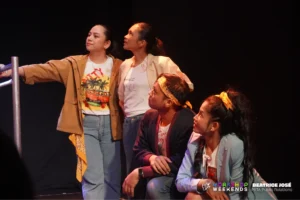

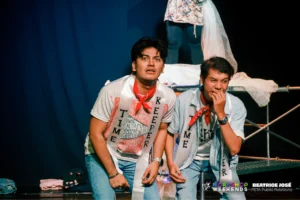

Our Company,
Our Story
Founded in 1967 by Cecile Guidote-Alvarez, the Philippine Educational Theater Association (PETA) is a pioneering Filipino educational theater group dedicated to positive social transformation. A theater for the nation, PETA has consistently used theater to educate and empower Filipino communities.
PETA’s history is marked by its resilience and innovation. During the Martial Law era, the company amplified the voice of the voiceless in addressing urgent social issues through its performances, education, and community work. PETA has cultivated a highly diverse repertoire encompassing over 300 plays across various forms. Its body of work includes original Filipino-language dramas that assert a national voice, hard-hitting People’s Theater productions committed to social justice, and impactful adaptations of world classics reinterpreted to resonate with Filipino experiences. PETA has also found success with contemporary musicals that tackle relevant social issues and maintains a strong commitment to educational outreach through plays written for young audiences.
From its roots in the iconic Dulaang Rajah Sulayman, PETA has since moved to its permanent home, the PETA Theater Center, in 2005. PETA’s modern productions range from fresh adaptations of classics (Haring Lear) to popular, contemporary musicals like the phenomenal hit Rak of Aegis. Today, PETA remains a leader in Philippine arts and culture, touring its educational performances nationwide and upholding its mission of using theater as a powerful tool for social development.
Our Mission
Philippine Educational Theater Association (PETA) is an educational theater organization dedicated to the development of an empowered and sustainable society. PETA is composed of members who are dedicated to the pursuit of excellent theater aesthetics and creative pedagogy.
PETA's mission is pursued through its three pillars:
Theater for Artistic Development (TAD)
Focused on fostering artistic excellence to create powerful, relevant plays that inspire and enlighten audiences.
Theater in Education (TIE)
Committed to enhancing the quality of education by helping teachers and empowering youth with creative skills, a sense of national pride, and social awareness.
Theater for Development (TFD)
Aims to empower marginalized communities by building their creative capacities so they can advocate for their rights and participate in decisions that affect their lives.
Inspired by a vision of nationhood and global understanding, PETA continues to serve communities by enriching lives through theater work on, off, and beyond the stage.
Our Vision
Founded in 1967 by Cecile Guidote-Alvarez, the Philippine Educational Theater Association (PETA) is a pioneering Filipino educational theater group dedicated to positive social transformation. A theater for the nation, PETA has consistently used theater to educate and empower Filipino communities.
PETA envisions:
Fully Actualized Human Being
Can liberate the creative power of the self and of others towards fulfilling their mission in life; continually refine their inner being; recognizes, respects and defends the rights of all beings; actively participates in societal endeavors and receives equal recognition, equitable remuneration, and opportunities; upholds and engages in collective care and responsible well-being; safeguards a nurturing environment to ensure the welfare of future generations.
Free Society
Justice and equality prevail; the culture promotes and protects human rights; peace and security reign, free from violence, oppression and exploitation; there is fair treatment towards all and respect for diversity in all its forms including sex, gender, age, religion, ideology, ethnicity and ability; a thriving economy responds to the needs of its people and there is just distribution of wealth; a government exists that genuinely protects the welfare of its citizen
Healthful Environment
Resource-efficient, where ecological harmony is conserved and protected; managed ethically and responsibly through sustainable development strategies for socio-political, economic, and cultural advancement.
Liberating Culture
Evolves from the depth and wealth of the people’s history is dynamic, progressive, and responsive to change; promotes empathy, critical thinking, and greater participation of all sectors of society; enhances creativity and empowers citizens to change society for people’s benefit; and engenders a strong cultural identity united by the recognition and respect for cultural diversity.
Awards & Recognition
1984
1984
- Manila Critics Circle. National Book Award Marilou L. Jacob (Drama), 1984.
1986
1986
- Katibayan ng Pagpapahalaga sa Philippine Educational Theater Association (PETA) Kawanihan ng mga Mangagawa sa Kamayanan Kagawaran ng Pagggawa at Empleyado, Intramuros, Maynila, Hunyo 18, 1986.
1987
1987
- ASEAN Awards 1987 Performing Arts Philippine Educational Theater Association (PETA), Bangkok, Thailand.
1989
1989
- Patnubay ng Sining at Kalinangan Special Award. Philippine Educational Theater Association (PETA). 418th Araw ng Maynila, City of Manila, June 23, 1989.
- “Si Panyo” at “g Hatol ng Guhit na Bilog”. Ikatlong Gantimpala Video (Feature). Ikatlong Gawad CCP (Cultural Center of the Philippines) para sa Alternatibong Pelikula at Video. November 21, 1989.
1990
1990
- Certificate of Recognition awarded to Handog ng PETA (Channel 9) finalist as the Best Drama Series Category. Philippine Movie Press Club (PMPC) 4th Star Awards for Television 1990. Manila Metropolitan Theater, October 29, 1990.
1991
1991
- 1990 Gawad CCP Para sa Telebisyon. Pagkilala sa Handog ng PETA. Sentrongf Pangkultura ng Pilipinas (Cultural Center of the Philippines), Maynila, Mayo 9, 1991.
- Gawad CCP sa Sining. Philippine Educational Theater Association, 1991.
1992
1992
- Parokya ng Birhen ng Lourdes Tanghalang Batingaw, Plake ng Karangalan Philippine Educational Theater Association. Parokya ng Birhen ng Lourdes, Mayo 29, 1992.
1993
1993
- Domestic Helper, Ms. Nora Aunor and the PETA cast. Appreciation Award for Outstanding Performance in the DH play. Alberta Domestic Workers Association (ADWA ’93-’94), Edmonton Alberta, Canada, October 1, 1993.
- PETA Kalinangan Ensemble “Domestic Helper” (DH). Plaque of Appreciation. The Filipino-American Community of Jacksonville, Florida Theater Jacksonville, Florida USA, October 20, 1993.
- The Minister of Multiculturalism and Citizenship Movement of Canada. Philippine Educational Theater Association (PETA). Edmonton, Alberta, Canada, October 1, 1993. Presentation of Domestic Helper (DH).
1996
1996
- National Council of Canadian Filipino Associations Montreal, Canada. PETA’s member Raul Alfonso and Rowena Basco at Planet Poverty. Montreal, Canada, April 30, 1996.
1997
1997
- “Ms.D”. Gawad ng Pagkilala sa Philippine Educational Theater Association (PETA). Ms. D., GMA – 7, EDSA, Diliman, Quezon City, Abril 17, 1997.
- Philippine Center for Population and Development. Plaque of Appreciation. Philippine Educational Theater Association (PETA). Baluarte de San Diego, Intramuros, Manila, November 27, 1997.
- Philippine Center for Population and Development. Plaque of Appreciation, 1997.
1998
1998
- Educational Research and Development Assistance (ERDA) Foundation Inc., Plaque of Appreciation, Philippine Educational Theater Association. Ma. Elena Yuchengco House – ERDA TUKLASAN Project, San Juan, Metro Manila, September 18, 1998.
- Philippine Educational Theater Association (PETA) Plaque of Acknowledgement 1998 Philippine International Theater Festival and Conference, in celebration of the Centennial of the Declaration of Philippine Independence, Culture Center of the Philippines, November 26 to December 6, 1998.
1999
1999
- Appreciation to Philippine Educational Theater Association – Women’s Theater Program (PETA-WTP) for bringing the informance “Tumawag kay Libby Manaoag” to the Caraga Region, Caraga Women’s Resource Center for Cultural Development, February 22, 1999.
- Philippine High School for the Arts and the 1999 National Children’s Arts Festival Committee. Certificate of Participation. PETA – Metropolitan Teen Theaer League. 1999 National Children’s Arts Festival. National Arts Center, Manila, 21-24 of October 1999.
- Plaque of Appreciation. Philippine Educational Theater Association. 1st Youth Cultural Festival. University Theater, University of the Philippines, Diliman, Quezon City, October 30, 1999.
2000
2000
- Drama Victoria Conference 2000. Empowerment Drama that makes difference.
- Shoreline Kabalikat sa Kaunlaran Incorporated, Shoreline Development Program assisted by World Vision Development Foundation Bancaan, Naic Cavite. Plake ng Pasasalamat sa PETA. Bancaan, Naic Cavite, Oktubre 29, 2000.
2001
2001
- Certificate of Appreciation. PETA Kalinangan Ensemble. Dreamweavers. Boholano-Foreign Friendship Foundation Ins. And Provincial Government of Bohol. Bohol Cultural Center, Tagbilaran City, Province of Bohol, November 10, 2001.
- Gawad Alab ng Haraya. “Kuwentong Asyano”. Katangi-tanging Produksiyon sa Teatro. National Cultural Center Association, 2001.
- Outstanding Performance in Theater – “Mga Kuwentong Asyano” – NCCA Gawad Alab ng Haraya, 2001
2003
2003
- Philippine Educational Theater Association, Inc. (PETA). Plaque of Appreciation. “Bread of the World”, Antipolo City, February 20, 2003.
2004
2004
- PETA, Plaque of Appreciation. Children and Youth Theater Festival 2004: “Unang Padyak, Unang Palakpak”, Camp Karingal Brgy. Sikatuna, Quezon City, February 15, 2004.
- Citation Philippine Educational Theater Association. Sining Kamboyaka Ensemble of the Mindanao State University and the National Commission for Culture and the Arts, Mindawan Art and Culture, April 5, 2004.
- Best Non-Musical Theater Production – “Agnoia” – ALIW Awards, 2004.
- National Theater Festival. Ikatlong Tagpo-Philippine Educational Theater Association (PETA) Tanghalang Pilipino, 2004.
- National Theater Festival. Ikatlong Tagpo-Philippine Educational Theater Association (PETA). Tanghalang Pilipino, November 7-20, 2004.
- Plaque of Appreciation – Children and Youth Theater Festival – “Unang Padyak, Unang Palakpak” 2004.
- Plaque of Appreciation. Philippine Educational Theater Association (PETA) for being participated and contributed to the success of the Children and Youth Theater Festival Against Children Trafficking. ECPAT Philippines. De La Salle – College of St. Benilde, Manila, December 16, 2004.
2005
2005
- Japan Foundation Species Prize for Arts and Culture. Philippine Educational Theater Association (PETA). Japan, October 4, 2005.
2006
2006
- The Philippine Heart Association Inc. and Servier Philippines Inc. Plaque of Appreciation Philippine Educational Theater Association as Guest Performer in the show “At the Heart of the Theater” other concerns of the heart year 8. PETA Theater Center, #5 Sunnyside Drive Brgy. Kristong Hari, Quezon City, February 22, 2006.
- Philippine Educational Theater Association (PETA) Plaque of Recognition. Development Action for Women Network (DAWN), Bayview Park Hotel, Manila, Philippines, February 10, 2006.
- Certificate of Appreciation, Philippine Educational Theater Association (PETA). Children’s Festival and celebration of the 17th Anniversary of the Convention on the Rights of the Child and the first ever Universal Children’s Day in Ormoc City. Central Plaza, Ormoc City, November 20, 2006.
- Sangguniang Kabataan Council Barangay Kalusugan, District IV Quezon City. Plaque of Appreciation. Philippine Educational Theater Association (PETA) for sharing their knowledge and expertise by conducting a Youth Workshop in Community Brgy. Kalusugan. Multi-purpose Hall, Brgy. Kalusugan, December 17, 2006
2007
2007
- The Federation of Catholic Schools Alumni/ae Associations (FeCaSaa) in partnership with the Good Citizenship Movement (GCM). Philippine Educational Theater Association (PETA) – the Benigno S. Aquino, Jr. Award for Social Artistry. University of the Philippines – National College of Public Administration and Governance, Quezon City, August 18, 2007.
- 20th Aliw Awards. Belong Puti, Best Non-Musical Production. Palacio de Maynila, November 28, 2007.
- Lifetime Achievement Award to Philippine Educational Theater Association. Aliw Awards Foundation, Inc. (AAFI), City of Manila, November 28, 2007.
2010
2010
- Ang Post Office, Best Non-Musical Production, Aliw Awards 2010.
- Si Juan Tamad, ang Diyablo at ang Limang Milyong Boto, Best Musical Production, Aliw Awards 2010.
2011
2011
- Institute of Politics and Governance. The Bayi Citation. Exemplary Women in Politics and Governance. Philippine Educational Theater Association. “Special Citation”, 31 March 2011.
- Certificate of Recognition – UPLIFT in supporting and committing as partner agency, 2011.
- CaredDivas, Outstanding Musica Production, Gawad Buhay 2011.
- William, Outstanding Play, Gawad Buhay 2011.
2012
2012
- Gawad Parangal/Most Outstanding Organization for 2012 – Republic of the Philippines, Quezon City 73rd Founding Anniversary.
- Plaque of Recognition. Philippine Educational Theater Association – Metropolitan Teen Theater League. “Sining ng Bata, Sining ng Buhay” – Children’s Arts Happening, 2012.
- Bona, Best Non-Musical Production, Aliw Awards 2012.
2013
2013
- “D Wonder Twins of Boac”- Outstanding Original Libretto, Outstanding Original Musical Composition, Outstanding Choreography for a Play, Outstanding Sound Design, Outstanding Set Design, Female Lead and Featured Performance in a Musical, Outstanding Stage Direction for a Play, Outstanding Ensemble Performance for a Musical, and Outstanding Original Musical – Gawad Buhay, 2013.
- “BONA” – Broadway World Manila and Phil stage Manila, 2013.
2014
2014
- Rak of Aegis, Best Musical Production, Aliw Awards 2014
2015
2015
- Rak of Aegis, Outstanding Original Musical, Gawad Buhay 2015
- Arbol de Fuego, Best Non-Musical Production, Aliw Awards 2015
